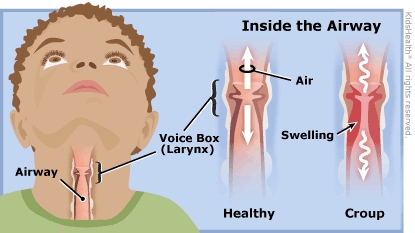An upper airway infection known as croup causes the airway to narrow and becomes more difficult to breathe. Another coughing sound associated with croup is barking.
Swelling and irritation around the larynx (voice box), trachea (windpipe), and bronchial tubes (bronchi) cause the cough and other symptoms of croup. The enlarged vocal cords make a sound akin to a seal barking when a cough pushes air through this constricted opening. Breathing frequently results in stridor, a high-pitched whistling sound.
The majority of cases of croup affect younger kids. Usually, it’s not a big deal. The majority of kids can get their croup treated at home.
Symptoms
A common cold often precedes croup. A child may experience enough swelling, irritation, and coughing to develop:
- Anxiety and distress, coupled with a loud barking cough that gets worse when the animal cries, can lead to a vicious cycle of symptoms getting worse.
- High temperature.
- Voice that is raspy.
- Laboured or noisy breathing.
Croup symptoms typically last three to five days, and they are frequently worse at night.
Causes
The most common viral infection that causes croup is the parainfluenza virus.
If your child coughs or sneezes into the air, they could breathe in infected respiratory droplets and contract a virus. These droplets contain virus particles that could live on toys and other surfaces. Your child may become infected if they come into contact with a virus-contaminated surface and then touch their mouth, nose, or eyes.
Prevention
Use the same precautions you take to avoid colds and the flu to prevent croup.
- The most crucial step is to regularly wash your hands for at least 20 seconds with soap and water.
- Keep your kids away from sick people.
- Urge your child to sneeze or cough into your elbow.
- Spot clean surfaces that are often touched.
Keep your child’s vaccinations up to date to protect them from more serious infections that could lead to croup. The vaccines against diphtheria and Haemophilus influenzae type b (Hib) protect against some of the most dangerous and uncommon upper respiratory infections. A vaccine to guard against parainfluenza viruses is currently unavailable.

































